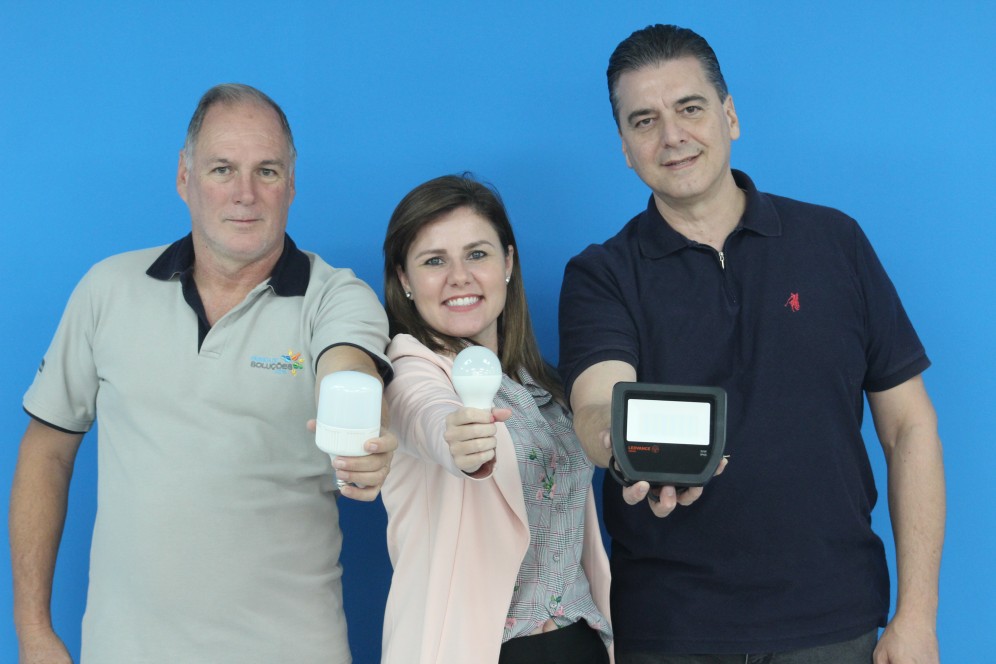Corporate Jun 6, 2019 1:00 PM
Less consumption; more sustainability
The thyssenkrupp’s Springs & Stabilizers unit has factories for the automotive sector located in São Paulo (São Paulo State) and Ibirité (Minas Gerais State). In production areas as well as in administrative offices, employee committees meet regularly to discuss how to minimize production’s environmental impact by reducing the consumption of natural resources and energy. To give an idea, the industrial sector consumes 32.9% of the electricity generated in Brazil, while households consume 9.7%, according to the country's Ministry of Mines and Energy.
The São Paulo plant's spaces are now better illuminated and using less energy, thanks to the replacement of all lamps used in the office and in the manufacturing area with more energy-efficient models. In 2016-2017, some 3.300 light bulbs were exchanged and, as a result, it was possible to achieve a 50% reduction in annual energy consumption for lighting.
In addition to saving electricity, the new LED bulbs last longer - four to five years - compared to a year and a half for fluorescent bulbs. This way, disposal of electric materials is also reduced over time.
“The employees approved it immediately, as the spaces became better illuminated, providing more visual comfort to activities at work. In the production area, we realized that tasks that require more attention in reading, such as measuring and quality control, for example, have also benefited”, says José Carlos Garcia, an industrial engineering specialist at Springs & Stabilizers São Paulo.
In the other thyssenkrupp plant located in Ibirité, the replacement of 1.300 fluorescent lamps with LED models took place in 2016 and provided a reduction of around 72% per year in energy consumption for illumination.
Water reuse reduces impact on water resources
ANA (the Brazilian Water Resource Agency) estimates that the manufacturing industry is the third largest water consumption area in Brazil, second only to urban residential distribution and irrigated agriculture.
Aware of this, since January 2016 Springs & Stabilizers Ibirité has a reuse station that collects rainwater through gutters, for use in the quick-wash where the equipment is cleaned. The monthly consumption of the quick-wash is 8.000 litres, which, due to water reuse, no longer comes from the public mains.
“Water mixed with oil from equipment washing is collected and passes through pipes and then through a treatment box that separates the water from the oil. As a result, the oil is trapped in a reservoir and the water with detergents goes to another location where it is pumped into tanks where it undergoes chemical and physical treatment for cleaning it and making it ready to be used again in a new washing process”, explains Guilherme Álvares, who works in the environment area at thyssenkrupp in Ibirité. This treatment cycle is performed four times, and after that the water is cleaned at the effluent treatment plant before it is flows into the stream near the plant.
Since 2017, the water for flushing toilets comes from an internal reuse station that has a 25.000-litre reservoir. “Water saving reaches 50.000 litres per month, which no longer comes from the water mains. We plan to expand reuse to 200.000 litres per month by 2020”, says Luiz Carlos Rodrigues, infrastructure supervisor at the São Paulo plant.
Planting of trees and recycling
The Ibirité plant has also become greener since February 2019, when 100 seedlings of trees native to the area were planted at the site. Nine species: Araçá, Pitanga, Pata-de-Vaca, Caroba, Ingá, Aroeira Salsa, Ipê Roxo, Paineira and Embiruçu were selected for mainly recovering the orchard and the slope of the area where the factory is located. In addition, another 150 seedlings were donated to the unit's employees, together with the necessary information on planting and plant care, so they can spread the greenery in their own yards or in other public areas of the city.
For more than 12 years, the São Paulo plant has encouraged selective collection of paper, plastic, metal and glass in partnership with the Raio de Luz recycling cooperative. In all, 40 tons of recyclable waste is collected annually at the plant, which reduces the amount of waste sent to the region’s landfills and contributes to generating income for the collectors who make up the cooperative.


